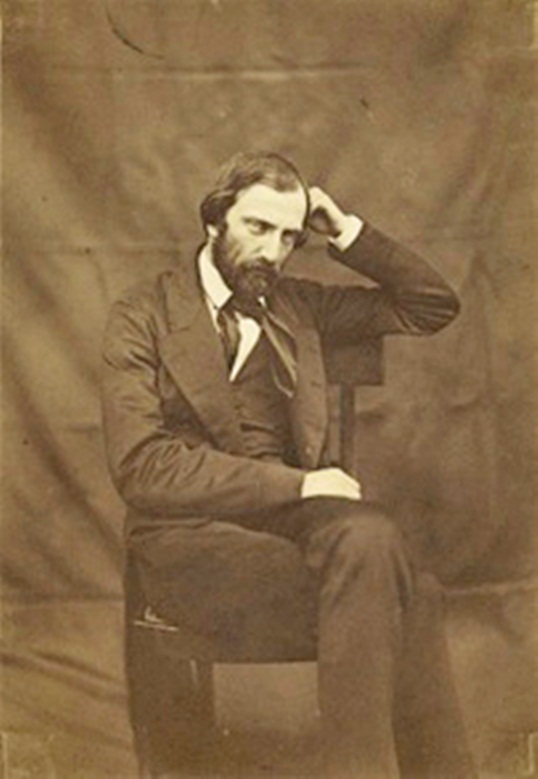François d'Orléans, prince de Joinville
François-Ferdinand-Philippe-Louis-Marie d'Orléans, prince de Joinville , also Franz Ferdinand Philipp Ludwig Maria von Orléans, Prince of Joinville, (born August 14, 1818 in Neuilly-sur-Seine near Paris ; † June 16, 1900 in Paris) was a French admiral .
Life
The prince de Joinville was the third son of the Duke of Orléans and later Citizen King Louis-Philippe (1773-1850) and Maria Amelia de Bourbon-Deux Siciles (1782-1866).
He was trained as a naval officer and became a lieutenant in 1836. In November 1838 he distinguished himself for the first time when he led a land command during the bombing of San Juan de Ulloa in the Cake War and personally captured the Mexican General Mariano Arista in Veracruz . He was promoted to captain and in 1840 commissioned to transport the remains of Napoleon with the frigate Belle Poule from St. Helena to France. In 1844 he led a naval operation on the coast of Morocco , bombed Tangier and took Mogador and was appointed vice admiral for it.
The following year he published an article in the Revue des Deux Mondes about the grievances in the French navy, which caused quite a stir. Through this article, his opposition to the Guizot Ministry and his manifest hostility to England, although he gained considerable popularity, the waves of the revolution of 1848 washed him away along with the other princes of the House of Orléans. He hastily left Algeria , where he was at the time with his brother, the Duke of Aumale , and with the rest of his family took refuge in Claremont , Surrey .
In 1861 , after the outbreak of the American Civil War , he went to Washington and provided the US government with his services and those of his son, the Duke of Penthièvre, and two nephews, the Count of Paris and the Duke of Chartres . He made the campaign of 1862 in the Union Army on McClellan's staff . Otherwise little was heard from him until he returned to France after the collapse of the Empire in 1870, only to be expelled immediately by the government of national defense. He returned incognito and entered the army of General d'Aurelle de Paladines under the name "Colonel Lutherod" , with whom he fought valiantly at Orléans. He later revealed his identity and asked for formal authorization to serve in the army. Nevertheless, Léon Gambetta sent him back to England.
In spite of all this, Joinville was elected to the new National Assembly by two departments in 1871 and received a seat for the Haute-Marne department , but only took it - after an agreement with Adolphe Thiers - after Thiers had been elected President of the Third Republic and the Exile decrees had been repealed in December 1871. His hearing loss prevented Joinville from playing a major role in the National Assembly and he resigned from his seat in 1876.
The Act against the Heir apparent of 1886 stripped him of his rank as Vice Admiral, but he remained in France, where he died on June 16, 1900 in Paris .
According to him, are Joinville Island in Antarctica as well as the places Joinville-le-Pont in France and Joinville in Brazil named.
Marriage and offspring
François de Joinville married Princess Francisca de Bragança (1824–1898), daughter of Emperor Pedro I of Brazil in 1843 . The couple had two children:
- Françoise (1844–1925) ∞ (1863) Robert d'Orléans, Duke of Chartres
- Pierre, Duke of Penthièvre (1845–1919), later also a naval officer
Works
The Prince of Joinville was the author of various writings on naval matters and other subjects of public interest, most of which were published anonymously or under a pseudonym. Only after the fall of the empire did he publish it again under his real name. This includes:
- Essais sur la Marine française 1839-1852. L'escadre de la Méditerranée. Notes on the naval forces de la France. - Lettres Franques. A Napoléon III Empereur des Français (1853);
- Etudes sur la marine (1859 and 1870);
- La Guerre d'Amerique, campagne du Potomac (1862 and 1872);
- Encore un mot sur Sadowa (Brussels, 1868);
- Vieux souvenirs (1894); on-line
literature
- The Prince of Joinville . In: Illustrirte Zeitung . No. 32 . J. J. Weber, Leipzig February 3, 1844, p. 81-82 ( books.google.de ).
- Jacques Guillon: François d'Orléans Prince de Joinville. 1818-1900 . Éditions France empire, Paris 1990, ISBN 2-7048-0658-6 .
Web links
- Literature by and about François d'Orléans, prince de Joinville in the catalog of the German National Library
| personal data | |
|---|---|
| SURNAME | Joinville, François d'Orléans, prince de |
| ALTERNATIVE NAMES | Joinville, François-Ferdinand-Philippe-Louis-Marie d'Orléans prince de (full name); Franz Ferdinand Philipp Ludwig Maria von Orléans, Prince of Joinville |
| BRIEF DESCRIPTION | French admiral and politician, member of the National Assembly |
| DATE OF BIRTH | August 14, 1818 |
| PLACE OF BIRTH | Neuilly-sur-Seine |
| DATE OF DEATH | June 16, 1900 |
| Place of death | Paris |


